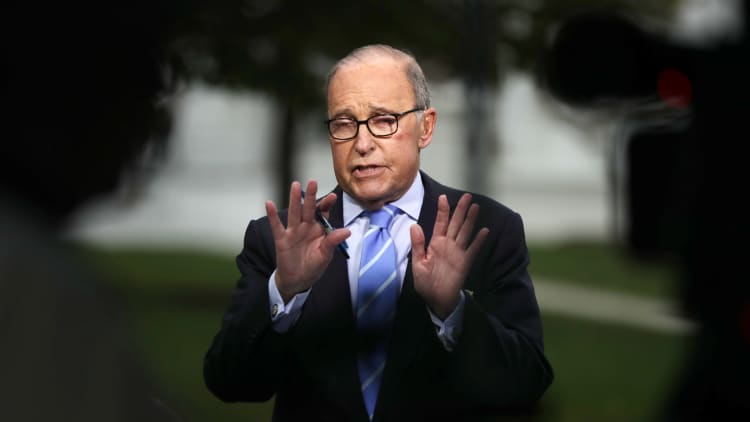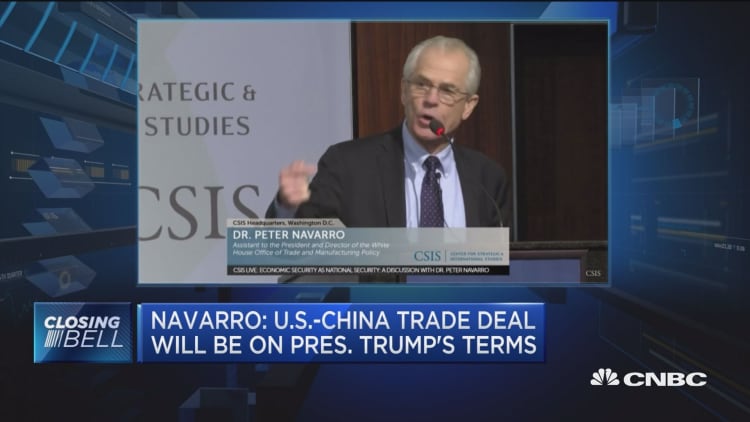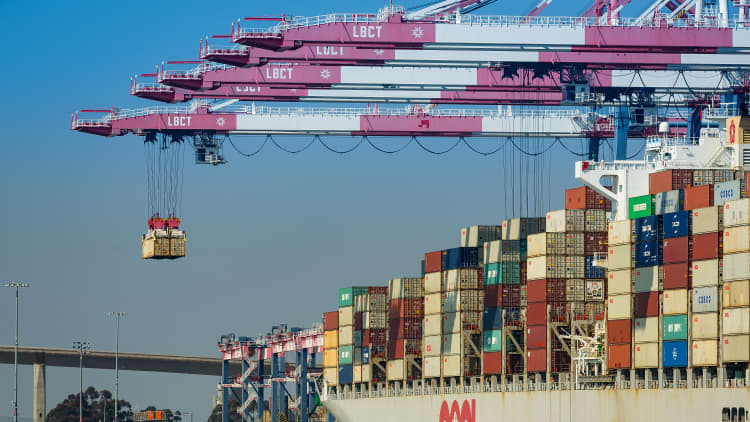Peter Navarro, U.S. President Donald Trump's trade advisor and a hardliner on China, has been sidelined by the White House — but prospects of a trade deal between the world's two largest economies remain bleak, experts told CNBC.
The U.S. and China have engaged in a trade fight this year, with Trump repeatedly attacking China for intellectual property theft, barriers to U.S. companies operating in China, and a massive trade imbalance. The U.S. president is expected to meet Chinese President Xi Jinping at the G-20 summit in Argentina this month to talk trade.
CNBC reported Wednesday that the White House has deliberately curtailed Navarro's public profile in the wake of an apparent dispute between him and top economic advisor Larry Kudlow.
Neither Kudlow nor Navarro is expected to depart from the White House.
With U.S. government officials currently engaged in high-level, preparatory talks with the Chinese government ahead of the Trump-Xi meeting, the U.S. administration is trying to manage its external communications to avoid derailing the upcoming bilateral talksRajiv Biswaschief economist for Asia Pacific, IHS Markit
But less visibility for Navarro isn't seen translating into more acquiescence on trade by the White House.
"We weren't expecting any substantive breakthrough at the G-20, even if Navarro hadn't been sidelined," Nick Marro, an analyst at The Economist Intelligence Unit (EIU), told CNBC. "Remember that he isn't the only hawk in the administration: Robert Lighthizer, who drove the initial investigations used to justify the U.S. tariffs, is also a hardliner on China."
"We expect Lighthizer to keep pressing China on its industrial policies, because at this stage, any trade deal is unlikely to resolve the issues at the heart of the dispute, such as forced tech transfer or intellectual property theft," Marro added.
The White House didn't immediately reply to CNBC's request for comment on the dispute between the two advisors and its possible impact on U.S. trade policy.
Navarro is easily one of the more aggressive White House advisors when it comes to China. He last week said that any deal with China "will be on President Donald J. Trump's terms. Not Wall Street's terms."
Kudlow refuted that directly on Tuesday, saying the "remarks were way off base."

But given how unpredictable the Trump administration can be, Navarro's status "could very easily change in a matter of days," noted Dane Chamorro, senior partner at Control Risks.
Chamorro told CNBC that China would be "very cautious about what they trust coming from the administration."
He pointed out that Beijing has been "burnt" before — when Trump snubbed Treasury Secretary Steven Mnuchin's efforts to reach a deal with Xi's top economic advisor Liu He in May.
Trump-Xi meeting at G-20
The more important trade signal is seen coming from the meeting between Trump and Xi, Chamorro said.
If anything, sidelining Navarro is only helpful "from an atmospheric perspective," he said. "It probably helps because if you don't have someone constantly clamoring on the issue, that helps a little. But that doesn't necessarily mean that the underlying issues have gone away or the underlying position has changed."

Now that high level talks between the two countries have started ahead of the meeting in Buenos Aires, the decision to lower Navarro's profile may have come about simply as a means of controlling the public message during a crucial period, said Rajiv Biswas, chief economist for Asia Pacific at IHS Markit.
"With U.S. government officials currently engaged in high-level, preparatory talks with the Chinese government ahead of the Trump-Xi meeting, the U.S. administration is trying to manage its external communications to avoid derailing the upcoming bilateral talks," Biswas told CNBC.
What's certain is the complaints that the United States — and other countries — have about China remain intact.
"Only a significant degree of domestic reform in China" to address "thornier issues" such as forced technology transfer, intellectual property theft and market access could pave the way for both sides to reach a deal, said the EIU's Marro.
— CNBC's Eamon Javers, Jacob Pramuk and Thomas Franck contributed to this report.
WATCH: How do tariffs work?



